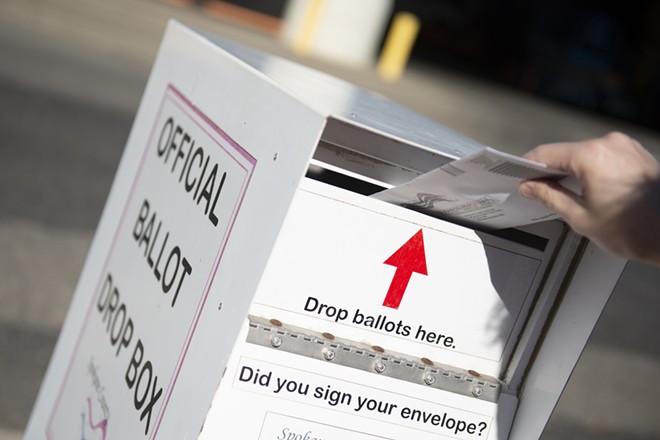From the very beginning, Kathryn Teske says, the whole thing was strange.
Two separate SUVs, she says, arrived at her house about 11 in the morning last Saturday — and parked in her driveway. Two women, one from each car, got out and rang the doorbell repeatedly.
Teske says the women introduced themselves as something like the "Spokane County Voter Integrity Board" and pointed to a printed-out sheet on their clipboard, with what she says looked like a photocopied Spokane County logo in black and white. At first, Teske says, she thought they were just there to encourage everyone to register to vote.
"I said, 'Oh, no worries, everybody who lives here is registered,'" Teske says. "And they said, 'That's not why we're here....We're looking for voter fraud. And we need you to confirm that all of the people on this list actually live here.'"
It was only later that she learned that, exactly a week before, volunteers from the same group had come to her house and spoken with her father, pressing him politely on similar questions.
They appear to have been volunteers with the Washington Voter Research Project, a "voter integrity" effort led by Thurston County conservative activist Glen Morgan, who characterizes it as an effort to "clean up the voter rolls." (Morgan says it's possible the team in Spokane may have been referring to themselves the "Spokane Voter Research Project.")
Yet the Teskes found the inquiries disconcerting and disingenuous.
"I don't know if it falls under voter suppression or voter intimidation," says Kathryn's husband, Ted Teske. "But [these] guys have no authority to be coming around, asking these questions of people, and insinuating that [they] have some authority from the county."
"This door-knocking process is not being conducted under the authority of the secretary of state's office or a county auditor," Spokane County Auditor Vicky Dalton says. "We would never go knock on people's doors and ask them about their voter registration."
She says she's received direct phone calls from two other voters disturbed by the door knocking by the same group or a similar group. One caller, Dalton says, claims one of the door knockers flashed a "fake-y metal badge." Both callers, she says, indicated that the door knockers had tried very hard to suggest they were there on behalf of the county or the state.
She says that Mark McClain, the civil attorney for the county, spoke with one of Morgan's volunteers at an unrelated meeting and emphasized that it was illegal for them to falsely claim they were county officials.
Morgan, however, says his volunteers are explicitly trained to make sure they don't misrepresent themselves — only the WVRP logo should be on their paperwork, he says — and throws his own salvo of accusations at Dalton.
"She's come out with things without checking at all, without actually talking to the people who were there," Morgan says. "She's come out and attempted to libel volunteers... there's something wrong with her."
Dalton says most of the voters in other counties who have come under scrutiny by Morgan's group for not residing at the address for which they are registered are voters who are military and overseas civilians.
"We have voters who are missionaries in places like Indonesia, who have been ex-pats for over 30 years," Dalton says. "They're American citizens. They absolutely have the right to vote!"
Asked how common he thinks voter fraud actually is, Morgan says he's not sure.
"It's hard to quantify," Morgan says. "I mean, how would you know, right?"
Actual examples of the kind of widespread voter fraud that could swing elections are rare to nonexistent. Morgan argues that his efforts ultimately build trust in the system. But even after the 2020 election had numerous conspiracy theories exhaustively examined and exhaustively debunked after former President Donald Trump's wild and false accusations of a stolen election, two-thirds of Republicans have consistently told pollsters they don't trust it was fair. ♦


